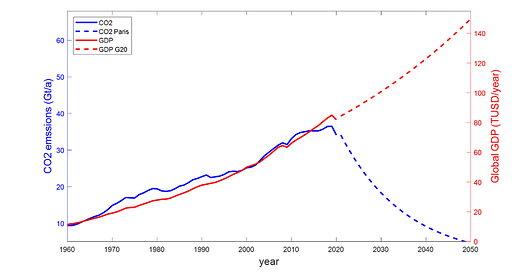Humanity is currently committing suicide by destroying the only habitable planet in the known universe. The question is what to do about it. To answer this question, we must first understand why we have completely failed to respond to the climate crisis, which is arguably the most urgent challenge facing humanity.
A phenomenon noticeable throughout history regardless of place or period is the pursuit by governments of policies contrary to their own interests. Mankind, it seems, makes a poorer performance of government than of almost any other human activity
- Barbara W. Tuchman, The March of Folly
Leadership can be defined as the art of making the right decisions based on incomplete information. Good leaders focus on the few things that everyone agrees on and use these to formulate a policy. This minimalist approach works well because political decisions are often quite crude, and their success depends on people’s willingness to cooperate. Attempts to micromanage societies have never been successful and it is better to define a small set of comprehensive and achievable goals. Too much information stands in the way of moral clarity and only the uncontested facts are helpful in the political debate. The COVID-19 pandemic has given us ample evidence of the validity of this observation.
Global Climate Compensation is a minimalist suggestion to stop climate change, thereby preventing a collapse of human civilization within the next 80 years. The plan consists of two simple steps:
All producers of fossil fuel pay a fee proportional to their production to a global fund.
The money from the fund is distributed among the world’s nations on a per capita basis.
The motivation and implementation of these steps will be described in detail in future posts, but in the spirit of keeping things simple, here are the uncontested facts needed to justify the plan:
We need to stop climate change.
The only way to accomplish this is to keep fossil fuel in the ground.
The most effective and fastest way to reduce the demand for fossil fuel is the introduction of a global carbon price to account for external costs.
Nobody should have to starve because of increasing energy costs.
If you agree with these statements, you are probably a supporter of Global Climate Compensation.
The reason for why we failed to respond to the climate crisis in the past is not because the problem is difficult, but because we never made it our priority. Figure 1 below shows historic data for GDP and CO2 emissions from 1960 to 2020 (solid lines) and the current climate policies (dashed lines).
If we assume the global economy to grow by 2% annually, the minimum proposed by the G20 nations, and we still want to stay “significantly below 2°C of global warming” as stated in the Paris agreement, we need a complete and rapid decoupling from fossil fuel. In particular, we need to reduce carbon dioxide emissions by roughly 50% during this decade. It is a simple mathematical exercise to show that this corresponds to a reduction rate of more than 7% per year. What part of “we need to reduce global carbon emissions by 7% in 2022” don’t we understand?
Humanity is currently trying to swim with a millstone around its neck. This millstone is called economic growth and it prevents us from getting our priorities straight. By focusing on growth, we limit the parameter space of possible solutions and essentially declare the financial system off-limits to innovation.
Stopping climate change is not difficult. Whether it can be done while growing the economy is a different matter, but it is also the wrong question. The question we need to ask ourselves is simpler but more fundamental:
Do we want to stop climate change and prevent the destruction of human civilization even if it turns out to be expensive?
If the answer is yes, we should prioritize the reduction of greenhouse gases and adjust the economy accordingly. Currently, all governments and mainstream political parties have decided that it is not worth it. By making economic growth their first priority, they have made climate protection contingent on our ability to square the circle. If a technological miracle happens in 2022, we will be fine. Otherwise, we are all going to die. That is no way to run a planet.
In a sense, our governments behave like First World War generals, whose thinking was so firmly rooted in the 19th century that they refused to change tactics even when the other side had machine guns. Their behavior was not only characterized by a remarkable lack of curiosity and creative thinking, but it also showed an almost total disregard for human lives. The young soldiers were expendables who could be easily replaced, at least if one did not waste time and money on training and equipping them.
Critics of high taxes often like to claim that it is too easy to spend other people's money. Apparently, it is just as easy to spend other people's lives. A society which treats young people as expendables and denies them the right to “life, liberty, and the pursuit of happiness” is not only morally corrupt but it is also doomed. Unfortunately, it is the society we live in.
Global Climate Protection cuts through the Gordian knot of climate politics by making the reduction of greenhouse gas emissions everyone’s first priority. It is agnostic towards growth, and it does not attempt to micro-manage people’s lives. And it could be implemented tomorrow.
(to be continued).
Zurich, 2022-01-18
One of the perks of being a professor is that one gets a sabbatical after 10 years. This means that I will be able to spend the six months from March to August working full time on stopping the destruction of the planet. Global Climate Compensation is one of the ideas I am going follow up on, but I am open to other suggestions, so please get in touch. You can find my contact information and CV here: www.nordborg.ch/about.
It is not enough that we do our best; sometimes we must do what is required.
- Winston Churchill
We only have one planet and very little time to save it. We need to act now!






"We'll go down in history as the first society that wouldn't save itself because it wasn't cost-effective." - Kurt Vonnegut
I like the graphs that show us talking about things superimposed on rising CO2 levels. It's the bottom-up way of admitting facts by just observing them: You don't have to understand humanity's malfunction to correctly identify the problem. The proof is in the pudding. All you have to do is look.
But even that is hard, and so we move on to figuring out why all humans live in their own realities. Above the philosophical level of observing and explaining this, is, I do believe, the scientific level.
According to How Minds Change by David McRaney, science shows how we disambiguate ambiguous facts (right down to what colour the famous dress was in 2015) based on our priors, ie. the experiences we have each been exposed to in our lives. Our subjective realities seem objective to each of us.
And so, the ability to live with intellectual curiosity and honesty and to change one's mind when presented with gainsaying evidence would be a wonderful thing for everyone to excel in. Clearly, that has never been and will never be the case, and so we must resort instead to "people skills" in order to change people's minds.
Obviously there is no easy way to stay close to +1.5C, as it won‘t be easy to implement global climate compensation. But it must be possible! At least I don’t see an alternative to this initiative at all. (Let us) go for it!